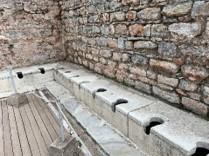 Which of the following words didn’t exist during the first century AD/CE when the novel Obedient unto Death takes place?
Which of the following words didn’t exist during the first century AD/CE when the novel Obedient unto Death takes place?
Café Metropolis
Suburbia Fork
Latrine Apartment
Three words didn’t exist then…
fork since the Romans and Greeks used only spoons and knives as eating utensils and apartment and café.
Is this important?
So glad you asked. A huge faux pas in writing historical fiction is using words that didn’t exist when the story took place. Critical readers will spot these blunders, while others will gloss over skyscraper, lowkey and under the radar. I became more vigilant when my editor questioned my use of the word suburbia.
Down the rabbit hole, I plunged.
 Latin sub- (beneath, below, lesser) + urbs (a walled Roman city) In the first century B.C. Dionysius discussed Rome’s growing urban center and its fluctuating boundaries stating: ”If anyone wishes to estimate the size of Rome by looking at these suburbs …. to determine up to what point it is still the city and where it ceases to be the city…” (Dionysius of Halicarnassus, Roman Antiquities, 4.13.3–5) (1) (Nemeth Adams 3D Ephesus reconstruction artist)
Latin sub- (beneath, below, lesser) + urbs (a walled Roman city) In the first century B.C. Dionysius discussed Rome’s growing urban center and its fluctuating boundaries stating: ”If anyone wishes to estimate the size of Rome by looking at these suburbs …. to determine up to what point it is still the city and where it ceases to be the city…” (Dionysius of Halicarnassus, Roman Antiquities, 4.13.3–5) (1) (Nemeth Adams 3D Ephesus reconstruction artist)

Speaking of cities, the word that surprised me most was metropolis. The picture that comes to mind is Superman, not ancient cultures. (μητρόπολις) is a Greek word derived from mḗtēr, meaning “mother,” and pólis meaning “city” or “town,” which refers to the original Greek colonial cities. Its first Middle English usage was around the 14th century. (Wikipedia.com) (Art by Alex Ross, wikipedia.com)

The word latrine is derived from the Latin lavatrina, meaning bath. Today it has the connotation of something being less advanced and less hygienic than a standard toilet. (Public toilets with flowing water in Ephesus).
The final two words I found challenging – I chose to use the Greek word Popinae or Popina, which means a kind of café. People stopped at these neighborhood fast-food restaurants to drink wine or grab a quick meal or snack. They would eat outside or inside if there were tables, but most people picked up food to take home after an exhausting day’s work. Obedient unto Death has Sabina stopping here to eat, but since these weren’t particularly sit-down establishments, the word restaurant didn’t fit, and café, derived from the Italian word for coffee, caffè wasn’t used until 1570 in Venice. (Wikipedia.com). I chose the unfamiliar Greek word, hoping my description conveyed a greasy-spoon tavern.

(Popina in Pompeii with holes where pots of soup or spiced wine were served.)

(painted counter advertising a snack bar)
Most urban Romans lived in crowded tenements called insulae situated in city blocks called insulae. These apartment buildings could be two, three, or a rickety ten stories high. Because insulae is used for the block and the building, I used the English word – apartment for clarification – even though the initial Italian appartamento didn’t exist until 1645.

(narrow Pompeii street)

(Insulae in Ostia, Italy, Wikipedia.com)
Experts estimate over 150,000 English words were derived from Greek. According to the Oxford Companion to the English Language, most Greek words have come into English indirectly through Latin and French. Writing fiction has many challenges, and historical fiction has over 150,000 more.
(1) traj-3965-mandich (1).pdf Re-defining the Roman ‘Suburbium’ from Republic to Empire: A Theoretical Approach Author: Matthew J. Mandich Pages: 81–99
Jones, Simon. The World of the Early Church: A Social History. Lion, 2011.
Yet the Greek definition of a large city was appropriate for many of the urban centers in ancient Greece and Rome Rome being the largest city in the history of mankind even surpassed, by London in the century. (the world of the early church)
(How has Greek) Words that starts with ‘ph-’ are usually of Greek origin: philosophy, physical, photo, phrase, philanthropy.
These include technical and scientific terms but also more common words like those above. How has Greek influenced the English language? | British Council
- phobia (fear of), as in arachnophobia
- micro (small), as in microscopic
- demos (people) as in democracy
| Αα | Alpha | Νν | Nu |
| Ββ | Beta | Ξξ | Xi |
| Γγ | Gamma | Οο | Omicron |
| Δδ | Delta | Ππ | Pi |
| Εε | Epsilon | Ρρ | Rho |
| Ζζ | Zeta | Σσς | Sigma |
| Ηη | Eta | Ττ | Tau |
| Θθ | Theta | Υυ | Upsilon |
| Ιι | Iota | Φφ | Phi |
| Κκ | Kappa | Χχ | Chi |
| Λλ | Lambda | Ψψ | Psi |
| Μμ | Mu | Ωω | Omega |
The Greek alphabet is the ancestor of the Latin and Cyrillic scripts.[6] (Greek alphabet – Wikipedia)
Well, Liisa, you certainly are no flaneur. :). You’ve managed to do an amazing amount of research while hosting family visits. The quiz was fun. I managed to guess two right out of the six words.
I’m glad you found it fun. I start something simple and end up with a blog that I’m not sure anyone but me cares about.
Fascinating!
Glad you enjoyed it. The words have changed a lot over 2000 years, so it ended up being more research than I expected. I had to dump several words because the meaning or spelling had changed too much.